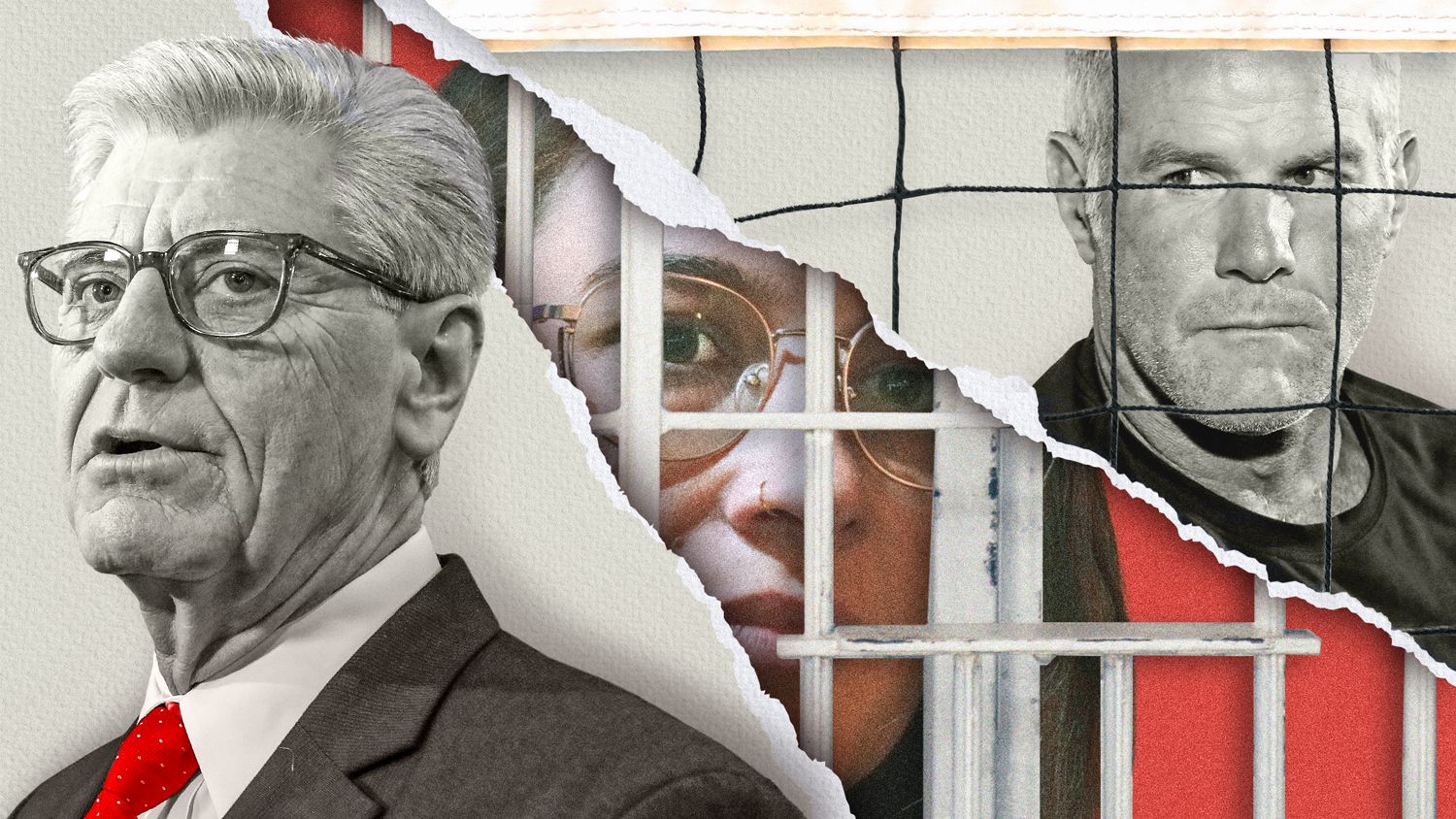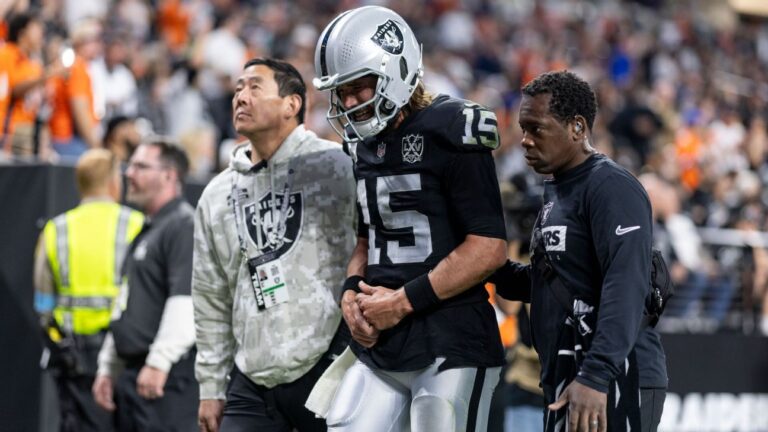-
Mark Fainaru-Wada, ESPN Staff WriterSep 25, 2024, 07:16 AM ET
- Investigative reporter for ESPN’s Enterprise and Investigative Unit since 2007
- Co-author of New York Times best-selling books “League of Denial” and “Game of Shadows”
- Co-winner, 2004 George Polk Award
JACKSON, Miss. — A little more than a year ago, a young reporter named Anna Wolfe was the talk of this town and of journalism for a series of stories that won her the coveted Pulitzer Prize.
She was invited to an exclusive dinner at the Washington home of legendary reporter Bob Woodward. A handful of media suitors reached out to see if she was ready to ditch Jackson and move on to the big time. She had even been offered a free treatment to rid her yard of mosquitoes by a local pest service.
Wolfe, a reporter with Mississippi Today, a nonprofit, online news outlet, won the Pulitzer for detailing a disturbing $77 million welfare fraud scandal in the nation’s second-poorest state, a scandal headlined by Mississippi’s most famous athlete, Brett Favre.
The reporting described how, with then-Gov. Phil Bryant in office, Favre and a handful of others scored millions of dollars that were supposed to go to welfare families but were instead used on projects that included a college volleyball facility and a concussion drug company.
Favre’s involvement elevated the story into national news, providing fodder for talking heads from Fox News to ESPN. In no time, some people were going to sarcastic extremes over the story, such as shirts that went on sale saying, in all capital letters, “Brett Favre stole money from poor people. Go Bears.”
Editor’s Picks
2 Related
Bryant and Favre both have said they had no idea the money was designated for welfare families.
It was against that backdrop last spring, a month shy of her 29th birthday, that Wolfe won the Pulitzer and celebrated with family, friends and colleagues at Hal & Mal’s, a Jackson institution. It was a moment that should have capped the journey on a story Wolfe had been chasing for five years.
Instead, not long after the Pulitzers were announced, the former governor sued Mississippi Today for defamation, setting off a battle that not only soured Wolfe’s and Mississippi Today’s moment but, more troubling to Wolfe, turned the focus away from the scandal itself.
That’s because not only has Bryant’s lawsuit not gone away despite Mississippi Today’s insistence that its reporting is truthful, but the former governor also recently asked a circuit court to hold Wolfe and the news organization in contempt of court. The governor wants all of Wolfe’s notes. He wants her emails. He wants her confidential sources. And the judge has ordered, at the very least, that Wolfe and Co. show him what they’ve got so he can determine its relevance to the case.
Mississippi Today has called the order “unconstitutional” and appealed to the state supreme court. Either way, Wolfe and her boss, Adam Ganucheau, have said there’s no way they’re giving up confidential sources. They say they would rather defy the court and face possible jail or, probably more likely, see their news organization get hammered with substantial damages.
What was once a story about poverty, power and Brett Favre, has now become a battle involving the First Amendment.
Mississippi Today reporter Anna Wolfe celebrates winning the 2023 Pulitzer Prize for her reporting on a sprawling $77 million welfare scandal involving former Mississippi Gov. Phil Bryant and Pro Football Hall of Famer Brett Favre. AP Photo/Rogelio V. Solis
IT HAS BEEN NEARLY 20 years since I almost went to prison for refusing to give up a source while reporting for the San Francisco Chronicle.
My situation also stemmed from a local story that exploded nationally, a story that was particularly elevated by the presence of a superstar athlete. That’s why I was asked to write this story.
I have a sense of what Wolfe and Ganucheau are thinking and facing: the hypotheticals they’re entertaining about how it will play out, the challenges of trying to get actual work done when your legal case consumes hours of each day, the emotional toll from worrying about your loved ones and colleagues, the creeping self-doubt.
“I feel like I’ve almost been questioning my ability to discern truth — or that’s what I think they want,” Wolfe says. “When you’re being told that you can’t read something and interpret it correctly, what do you do with that? It’s gaslighting, but I’ve never come up against that before.”
Without question, Wolfe’s case and mine are very different. For me and my then-colleague at the Chronicle, Lance Williams, ours was a leak investigation. We had been reporting stories for more than a year on a steroids distribution case that came to be famously known as the BALCO scandal, named for the Bay Area Laboratory Co-Operative; our reporting revealed how some of the world’s greatest athletes, most notably the San Francisco Giants slugger Barry Bonds, used steroids and other drugs to generate record-breaking performances.
Our biggest blockbusters stemmed from the grand jury testimony of the athletes themselves. We quoted from transcripts in which most of the athletes admitted under oath to using a wide range of drugs. But those stories led the judge in the case to order an investigation into where we got the transcripts. Somebody, the judge said, unlawfully leaked material, and that somebody needed to pay.
In the spring of 2006, Lance and I were subpoenaed to give up the source or sources of our stories. That season, as Bonds belted homer after homer into the San Francisco Bay to pass Babe Ruth and inch closer to becoming the greatest home run hitter ever, we squared off against the federal government. At one point, we appeared before a judge and were sentenced to up to 18 months in prison, though we were allowed to stay free while we appealed.
The differences between our case and Anna Wolfe’s: Ours was in the federal courts, hers in the state. She’s being sued by a former governor for defamation, whereas we had the FBI coming after us. And another big difference: The material she used came from emails and text messages involving public officials. Wolfe never quoted an anonymous source in any of her stories.
Despite the differences, I have a unique understanding of Wolfe’s experience, and we share common ground in the fact that a nationally famous athlete looms over the reporting. Something Wolfe has never loved.
That said, she recognizes Favre’s place in the story has drawn attention to the reporting and exposed it to a far broader audience.
“I think that Favre’s involvement in this story obviously led to everything that happened after, and I didn’t really appreciate that,” Wolfe said. “I didn’t really appreciate how that was going to impact how many people paid attention to the story and how the number of people who pay attention to the story changes the story.”
Favre, meanwhile, has waged his own defamation battle with the media; specifically, the former Packers quarterback filed lawsuits against former NFL tight end Shannon Sharpe and media personality Pat McAfee, who both now appear on ESPN. The suit against McAfee was dropped after the commentator essentially apologized and said he was joking.
The Sharpe case stems from him calling Favre a “sorry mofo to steal from the lowest of the low” and saying Favre “stole money from people that really needed that money.” The lawsuit was dismissed last year, but Favre asked an appeals court in July to revive his case. On Sept. 16, the court turned him down.
Also in July, Favre’s business associate in the concussion drug company, Jacob VanLandingham, pleaded guilty to wire fraud in the welfare fraud criminal case. Six others also have pleaded guilty in the case. Favre has not been charged with any wrongdoing.
Then-Gov. Phil Bryant speaks to reporters on Aug. 29, 2018, at the Capitol in Jackson, Miss. AP Photo/Rogelio V. Solis
IN APRIL 2022, Mississippi Today published “The Backchannel,” a five-part series released over two weeks. Using Phil Bryant’s “own words,” in “never-before-published conversations,” Mississippi Today said the stories uncovered “the depth of the former governor’s involvement within a sprawling welfare scandal that plagued his administration.”
The very first story began, “Former Mississippi Gov. Phil Bryant used the authority of his office, the weight of his political influence and the power of his connections to help his friend and retired NFL quarterback Brett Favre boost a fledgling pharmaceutical venture.”
The series described how the Favre-backed company and a volleyball project at his alma mater received millions of dollars that were supposed to go to the state’s poorest people.
Bryant did not sue the organization immediately after those stories were published nor did he sue within a year of the stories running, as defamation cases require by state law.
But then, in February of last year, just months before the Pulitzers were to be announced, Mississippi Today CEO Mary Margaret White appeared on a panel at a national conference and said: “We’re the newsroom that broke the story about $77 million in welfare funds, intended for the poorest people in the poorest state in the nation, being embezzled by a former governor and his bureaucratic cronies and used on pet projects like a state-of-the-art volleyball stadium at Brett Favre’s alma mater.” (Since White made her statement, Louisiana has passed Mississippi to have the country’s highest poverty rate, according to the U.S. Census Bureau.)
There was a major problem with White’s statement: In fact, Wolfe’s reporting did not at all suggest Bryant had embezzled money, and the former governor had denied even knowing any funds were misused.
On May 8, Wolfe and Mississippi Today won the Pulitzer. Two days later, Bryant’s lawyer, Billy Quin, addressed a letter to White, Wolfe and Ganucheau, demanding a retraction and an apology for “White’s false and defamatory statement,” as well as statements by Wolfe and Ganucheau that no one from Mississippi Today had claimed Bryant had committed any crimes. Quin alleged the two made their remarks in a podcast after White made her statement.
One week after Quin sent his demand letter to Mississippi Today, a note from White was posted on the organization’s website. It began: “I misspoke at a recent media conference regarding the accusations against former Governor Phil Bryant in the $77 million welfare scandal. He has not been charged with any crime. My remark was inappropriate, and I sincerely apologize.”
Quin says he and Bryant didn’t view that as a sincere apology. They were particularly struck by the suggestion that White “misspoke” and that there were “accusations” against Bryant, as well as the inclusion of the line, “He has not been charged with any crime.”
The governor’s lawsuit followed soon after.
“That’s why this whole thing is so incredibly frustrating,” Wolfe says. “I am getting punished for something that I had no control over. I think most people can see that. I can’t even start to describe what a travesty that is. That sucks, because it wasn’t the reporting.”
White says, “Anna’s reporting is airtight. As I said in my apology, I made a mistake, and it’s something I wrestle with every day because of the good work of Mississippi Today and of Anna particularly.”
The courts in the wellness center at the University of Southern Mississippi are home to the women’s volleyball team. AP Photo/Rogelio V. Solis
BILLY QUIN SAYS he’s largely known for supporting Democrats in a state run largely by Republicans. He insists he has great respect for the press and, in fact, points to a framed article in his office written by Jerry Mitchell, Mississippi’s most famous and accomplished investigative journalist.
Mitchell’s work at The Clarion Ledger led to the reopening of several cold case murders from the Civil Rights era, and he now works with Wolfe at Mississippi Today.
Nevertheless, Quin says he believes that Wolfe and Mississippi Today had it out for Bryant, and that “The Backchannel” series is and was a pretext for turning the welfare fraud scandal into a “political weapon.”
Quin says that he didn’t sue over Wolfe’s initial reporting within the one-year window because he was juggling other issues related to the welfare fraud case and “it took me that long to get my arms around it.”
Quin insists both in an interview and in his filings that his case also stems from articles Wolfe has written in the past year and statements she and Ganucheau have made during interviews. But it’s clear White’s comments at the national conference are what set off the governor and opened the door for Quin even to be able to file suit. And during a 90-minute interview, the lawyer repeatedly cited White’s words in explaining his case.
Would Bryant have sued if White hadn’t said what she said?
“It’s a good question. I don’t know. Maybe,” Quin says. “… It most certainly launched the idea. It was sort of what caused the dam to break. It was the thing where the line was drawn and we said, ‘Enough is enough.'”
Regardless, Quin believes he has every right to get Wolfe’s confidential sources, notes and even internal emails to see if there’s anything that suggests a bias toward Bryant. To win libel cases against journalists, plaintiffs must meet the standard established by a 1964 Supreme Court ruling that requires proving the defendant knew the statements were false or published them with reckless disregard for the truth or actual malice.
Quin argues that, to help meet that standard, he needs access to internal emails or conversations with confidential sources. Asked about the implications of going after that material, Quin says, “I hope the implication is that if you’re a reporter and you lie about somebody, you better be ready to defend your lies. And if you cannot, you should understand that there are consequences that go with that. You’re not immune to the law. You’re not.”
Wolfe and Mississippi Today insist there’s nothing inaccurate in their reporting. On Wednesday, the organization received the National Press Club’s highest honor for press freedom.
Most states in the country, including Mississippi, have recognized at least a limited privilege that protects reporters from being forced to give up confidential sources. Even so, there’s no formal “shield law” in Mississippi, and no case has ever made its way up to the state Supreme Court — until now. First Amendment advocates say that, without shield law protections, sources would be far less likely to come forward with critical information that serves the public interest.
Mississippi Today’s lawyers have argued that the court should rule first about whether Wolfe has a privilege that will keep her from having to give up her sources. Quin says the law is clear that the circuit court should get to look at the material first, and that by refusing even to show the judge what they’ve got, Wolfe and Co. should be held in contempt.
That doesn’t necessarily mean jail. He says the court has “wide discretion” on possible sanctions, which could include fines, perhaps the more likely scenario in a defamation suit in which Bryant wants compensation if he can prove his case. “This is a suit for money damages,” Quin said. “I’d much prefer a default judgment.”
There’s no timeline for when the Mississippi Supreme Court will rule on Bryant’s lawsuit. It could be weeks or months. Wolfe has largely moved on to different stories, even as she seeks peace amid the uncertainty.
Then-San Francisco Chronicle reporters Lance Williams, center left, and Mark Fainaru-Wada, center right, talk to the media outside the federal courthouse in San Francisco on Sept. 21, 2006, ahead of a judge’s decision in the BALCO steroids case. AP Photo/Darryl Bush
LOCAL JOURNALISM IS clearly dying, slowly and painfully. This is true in Mississippi as much as anywhere. The Clarion Ledger, once the paper of record in the capitol and once Wolfe’s employer, now has just five news reporters to cover state and local news, one of whom is an intern. The paper recently reported on the closing of three 100-year-old weeklies.
Last year, more than 2.5 newspapers shut down per week, according to a Northwestern University report, which added that nearly 2,900 local papers and 43,000 reporting jobs have been lost since 2005.
During that time, a nonprofit model emerged to varying degrees of success. White has said the organization’s annual budget is $2 million, most of which is used to pay reporters and editors on a staff of 23.
Bryant’s case is having a financial impact on Mississippi Today. The organization employs a local First Amendment lawyer, and it also has hired national outside counsel to support its case. Ganucheau says his organization already has used more than $500,000 from a $1 million insurance policy to cover legal fees.
It’s the kind of thing that leads him to say he fears financial losses more than personal ones.
“I would almost rather personally sit in jail for months than let that happen,” Ganucheau says. “Really. That [legal expense] would have this huge long-term effect on our ability to do this journalism in Mississippi.”
Mississippi Today reporter Anna Wolfe’s award-winning series focused on a $77 million welfare scandal, the largest misuse of federal funds in Mississippi’s history. (AP Photo/Rogelio V. Solis, File) AP Photo/Rogelio V. Solis
I RECENTLY SPENT a couple days with Anna Wolfe in Jackson, asking about her experience and sharing mine. She had lots of questions, as did I, and the conversations were sometimes difficult.
In describing her life at the moment, Wolfe was at once steely and businesslike, then apt to break down in tears when asked how she was doing. It was clearly not a weakness thing. I could see she was overwhelmed at times. And frustrated. And angry. For one thing, she believes Bryant’s lawsuit is designed to make her and other reporters second-guess themselves.
“I don’t want it to [seem like] I’m thrown in a tizzy by this, I just want to get it right,” Wolfe said, explaining the challenges affecting her mindset. “And I don’t want anything I’m talking about to be perceived as me questioning whether I got it right. Because I did get it right.”
ESPN reporters Anthony Olivieri and Xuan Thai contributed to this report.







